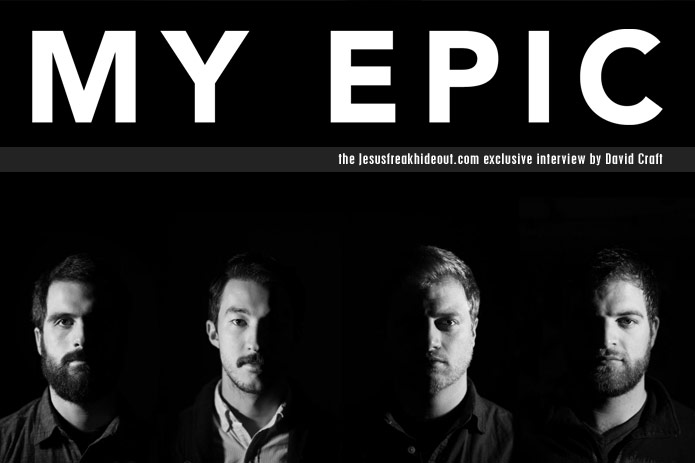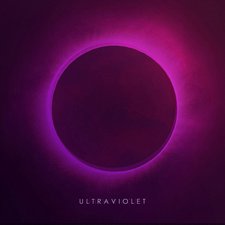
Aaron Stone: Yeah, of course! We just released Ultaviolet EP earlier this year, and are now working on the second half, Violence. Together, we think of them as a full-length. We might release the two EPs again eventually as one called Ultraviolence, but we're not quite sure. We've written four of the upcoming songs, and they are… heavy. They're rocking. I mean, they're not without their soft moments, because dynamics are sorta what our band's about. Even if you think of our heaviest songs, like "Hail" or "Lower Still," there are still those moments.

Aaron: Yes! There has to be. That's who we are as a band. So, if people are expecting five "Lower Stills" or "Hails," they might be disappointed, 'cause we never really try to do the same thing twice. We love those songs and we don't want to try to rewrite them, because nothing good ever happens when you try to cover yourself. (*laughter*) We're trying to figure out what's next and we're excited about it. We're hoping to go back to the studio at the end of the year. We were hoping the record would come out at the end of this year, but it's probably going to be early next year. Probably March or something like that. We're wanting to do more touring for the [next] record. I've been kind of torn trying to get my head around what the lyrics are about. Four of the songs are written musically but there are no lyrics yet.
Aaron: I'll know a little more when I've finished writing. I know, as far as it relates to me, is that I'm continuing to grow in my faith. I know that Jesus has made Himself more precious to me, but a lot of the things people attach to Him I don't think are true and I don't want any part of.
Aaron: *laughs* Let me write the record first and then it'll do the talking for me. I don't write to explain; I write to understand. When I finish writing, I'll be able to talk about it more. But I think there's a lot of things that just don't look anything like a homeless man from Israel 2,000 years ago. I think there's a lot of things right now that the church is putting up with that are pretty embarrassing. I think there's a time for everything. I think there's a time for hate and I think there's a place for it when it's done right. The hatred shouldn't be aimed at people, but it should be aimed at things which are ugly. Things that are not beautiful. Things that are not like Jesus. I think there's a time for violence, and I mean that metaphorically, obviously, but there's a time to say "no, this I hate." I really feel like writing that record as sort of [an album of] I don't know, hateful hymns? But in a really good sense where we're going to loudly hate the things God hates.
Aaron: Maybe. Or people. Jesus had no problem showing anger towards people. He was still willing to show them grace, and that's always where I don't ever want to view someone as a "them." They're just a different "me." So I want to show grace to them, but that doesn't mean we allow--well, there's a thin line. It gets over-Christianized with "love the sinner, hate the sin." There's some truth to that, but it's probably a little too simple. But I think there's a lot of tables Jesus wants to flip right now. That's sort of where my mind is at and I think a lot of Christians need to hear again that a certain party or a certain people do not speak for God, and that He is more wild and more beautiful and even more redeeming and even more forgiving than anyone can imagine. I want to be violently forgiven and violently redemptive.
Aaron: Yeah! It's funny, because [Levi's album] Cataracts is kind of Ultraviolet-ish and a little Violence-ish. We realized on the first night of this tour "oh, we wrote the same album." But that's cool, because it's what's happening and we have to talk about it. I'll know more when I get [Violence] done, but I guess a personal example would be when my wife and I had a miscarriage on Christmas day. It was really tough; it was really painful; it was really hard. When we got home, we were praying through it and I told her "you are welcome to hate this. Because God hates this. He hates death. He hates pain. That's why He was willing to let His son be tortured to death to end it. So we're gonna love God, we're gonna pray through the things we don't understand, and we're gonna hate this. So hard." And it's been a part of healing. You don't heal if you don't respond the way God would respond. You bottle stuff up you shouldn't. Does that make sense?
Aaron: The basic root of Ultraviolet is summed up in that one line, "I think we're all lost 'till we've walked in the wilderness." That's kind of what the record's about. I think that it's part of the process, but we don't talk about it, so when it happens, we feel like we're losing our faith. But every great saint has gone through a season of learning, and honestly, I think it's God stripping away some of who we think He is but He's not.
Aaron: It's painful, because some of that stuff feels like the foundations. There's a line on the new record, "it's so hard with panic in your bones to know an anchor from a millstone." Something you ask is "can I let go of this thing? Is this at the very core of what I believe, or do I have to get rid of this? Is this the thing that's going to kill my faith?" And that's a process. I quoted him tonight, but Derek Webb is a musician who I think is an incredible artist, and he said when he was losing his faith -and I don't want to misquote him- but I think what he said was "in the church. it's like your dad is dying, but you can't tell anyone about it." So I think we need to be talking about it and separating a lot of these things that seem central to faith [but] aren't necessarily central. For the better part of a millennium, most Christians had no access to the scriptures. What made them Christians? They believed Jesus was God's son, that He lived and He died and He [was] resurrected. That's what made them Christians. That's what makes us Christians. Everything else we've added onto it since then, I think, can be dangerous. We do believe in knowledge, we want to study, and we want to find all we can, but it can easily be turned into a god of a perfect systematic theology. If our theology doesn't allow for a really large portion of mystery, then we're going to fail because God is so massive.
Aaron: Yeah; look for Violence early [2019], and we'll be touring more in 2019, so come see us at a show!
 Elevation Worship Releases New Album, "SO BE IT" Elevation Worship Releases New Album, "SO BE IT"Fri, 20 Feb 2026 17:07:00 EST |
 Christian Hip-Hop Artist Justin Mitchell Announces "The Reset EP" Christian Hip-Hop Artist Justin Mitchell Announces "The Reset EP"Fri, 20 Feb 2026 17:01:00 EST |
 Worship Music Pioneer Paul Baloche Announces New Live Album Worship Music Pioneer Paul Baloche Announces New Live AlbumFri, 20 Feb 2026 16:55:00 EST |
 Chris Tomlin Brings Back Worship Under the Stars for Fall 2026 Chris Tomlin Brings Back Worship Under the Stars for Fall 2026Fri, 20 Feb 2026 16:40:00 EST |
 Holly Brand Debuts New Song, "I Know Somebody" Holly Brand Debuts New Song, "I Know Somebody"Fri, 20 Feb 2026 16:29:00 EST |
 Grace Graber Releases Her Full Punk Take on Brandon Lake's "Gratitude" Grace Graber Releases Her Full Punk Take on Brandon Lake's "Gratitude"Fri, 20 Feb 2026 16:20:00 EST |
 Kid Rock Makes Billboard History with First-Ever No. 1 on Billboard Hot Christian Songs Kid Rock Makes Billboard History with First-Ever No. 1 on Billboard Hot Christian SongsFri, 20 Feb 2026 16:11:00 EST |
 Click here All News Headlines |
Click here All News Headlines |